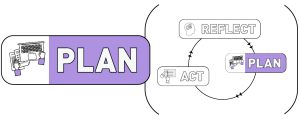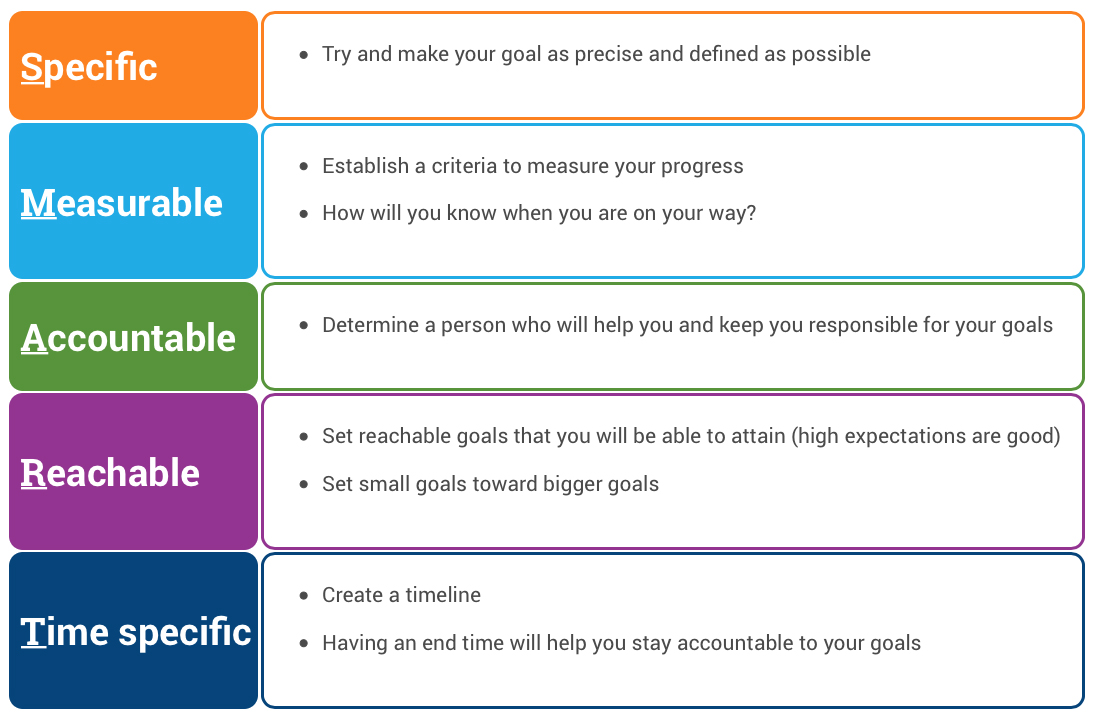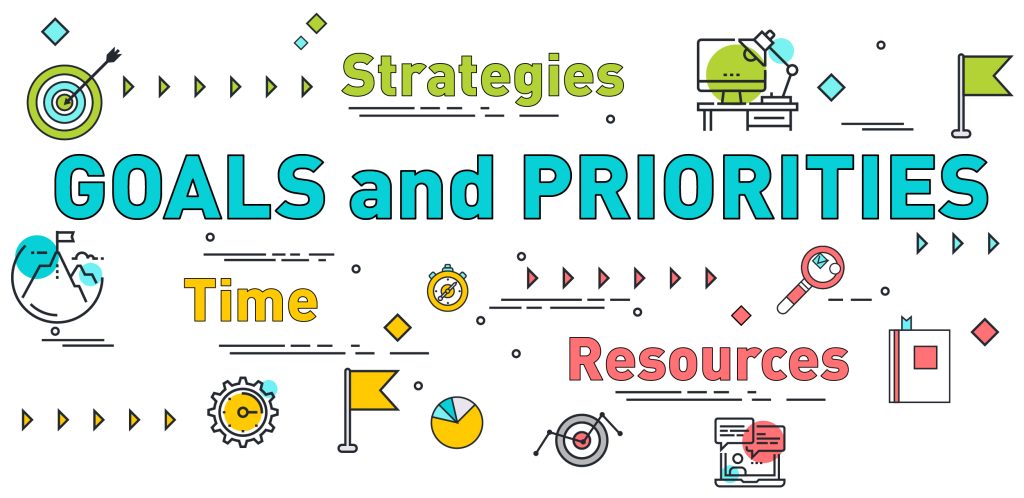Plan phase
Planning for success
Achieving success with SRL and a growth mindset requires knowing your priorities and setting goals.
During the reflect phase you outlined your priorities. Now, with these priorities in mind, you can set your goals. In the plan phase you will chart your course to attaining your goals through:
- Deciding on strategies
- Planning your time
- Identifying resources you need
What is a SMART goal?

In this section, you will develop and refine brainstormed goals and transform them into actionable statements that you will be able to work toward during this module. Your brainstormed goals will become SMART ones.
People who set SMART goals are more likely to achieve their target. Let’s take a look at the components of SMART goals. Transcript (.pdf, 11kb).

Complete the activity below to identify SMART goals.
Define and refine your goals

Complete the activity below to outline your goals for the deadlines you’ve chosen and then refine them to make them more achievable.
Here are some examples of goals you may wish to work towards to help you get started!
- I will practice using a growth mindset voice and redirect myself whenever my mindset becomes fixed.
- I will construct a schedule for this semester and set priorities so that I stay on track.
- I will transform my previous goals into SMART goals.
- I will practice “present-time awareness” and mindfulness meditations so that I am more focused on the task at hand.
Problem-Solving in the Context of Type I/II Thinking
Please watch the following video (from the identification task).
In the following activity, for each of the following situations, decide whether Type I or Type II Thinking would be most appropriate.
In the next activity, the situations may not be as clear with requiring Type I or II thinking. When reading through each decision, jot down whether you’d choose a Type I or Type II process to reason how you’d approach the situation. The goal here is to understand how context defines what type of thinking should be used.
For this activity, for each of the following situations, decide whether Type I or Type II thinking would not be appropriate. Please click on the option that would not be appropriate given the situation.
Metacognitive Skills and Type I/II Thinking
Building metacognitive skills with respect to Type I and Type II thinking is important in improving decision-making, problem-solving, and learning in various aspects of life. In fact, we often use metacognition in our everyday lives without even realizing it. For example, when you are learning something new, you likely monitor your understanding. If you struggle with something, you choose to go back and review or practice (an example of a metacognitive strategy!). You may also naturally plan your day and tasks by thinking about what you need to get done, what order you want to do it in, and how much time each task will take (another example of planning using a metacognitive strategy!)
Here are some examples of how metacognitive skills can be applied, click on each strategy to learn more! :
In the following activity, write down a brief list of skills you already possess that can help you in using Type I/II thinking and a list of skills you want to work on in your decision-making and problem-solving approaches.
In the next few sections, we will discuss how to use goal-setting and different metacognitive problem-solving strategies to build your metacognition.
.
SMART Goals and Type I/II Thinking
When it comes to decision-making or problem-solving, specifically one more aligned with a Type II context, SMART Goals can be used to plan, monitor and evaluate your approach to a problem or situation that may have multiple layers of complexity or is unfamiliar to you. In this case, taking the time to plan and identify different approaches and strategies can help alleviate stress and help you more efficiently respond.
In contrast, Type I problems or decisions require you to make an instantaneous decision or relies on familiarity to understand how to approach it based on your previous knowledge. In such a case, SMART Goals may not serve your best interest as Type I is a quick decision made at the moment. Type II requires more time and effort to best approach the problem or decision!
Here are two examples of using SMART Goals to outline an approach to a problem or an outline for helping you reach a decision.

SPECIFIC:Complete the challenging calculus problem, showing all necessary steps.
MEASURABLE: I will show my work in my solution and ensure each step is clear.
ACHIEVABLE: I will review relevant concepts for 30 minutes before attempting the problem to ensure I understand the approach.
RELEVANT: Successfully solving this problem will improve my understanding of this calculus concept and help my complete the assignment on time.
TIME-BOUND: I will complete the problem within the next two hours.

In contrast, Type I problems or decisions require you to make an instantaneous decision or relies on familiarity to understand how to approach it based on your previous knowledge. In such a case, SMART Goals may not serve your best interest as Type I is a quick decision made at the moment. Type II requires more time and effort to best approach the problem or decision!
Here is another of using SMART Goals to outline an approach to a problem or an outline for helping you reach a decision.
SPECIFIC: I will decide if I should buy a new phone by comparing its features, prices, and customer reviews.
MEASURABLE: I will create a list of at least three options and compare their key features, price differences, and customer ratings.
ACHIEVABLE: I will spend 20 minutes each day researching and reviewing the phone options, checking multiple sources for up-to-date information.
RELEVANT: This decision will impact my daily convenience and communication needs, as my current phone is no longer meeting my expectations.
TIME-BOUND: I will make my decision and purchase the phone by the end of this week.
Planning involves identifying strategies and developing a plan and schedule to achieve your goals you set in the reflect phase. To plan, you will decide on strategies, plan your time, and identify the resources you need. By defining and refining your goals they will become more achievable.
Self-regulated learning can be achieved through the SRL cycle. The SRL cycle allows you to take strategic control of how you approach your goals and be prepared and willing to face any challenges and seize any opportunities that might arise as you work to make your goals your reality. The SRL cycle consists of three phases: reflect, plan, and act. Ideally, you should repeat this cycle multiple times as you create goals and tackle challenges.
The belief that your basic abilities can be developed and cultivated through hard work and dedication. Someone with a growth mindset views their basic skills and talents as a starting point, therefore creating a love of learning and resilience that is essential for great accomplishment. Great learners are made, not born.
SMART goals can be used in all aspects of your life and allow you to develop your goals into actionable statements that you can work towards, rather than goals that seem overwhelming or difficult. There are 5 components to a SMART goal: Specific, Measurable, Accountable, Reachable, and Time Specific.
A particular milestone in your semester or year that you are preparing for. The deadline could be an exam, assignment, competition, etc. The key idea is to identify specific timepoints using these deadlines so that you can check your progress toward your goals.


